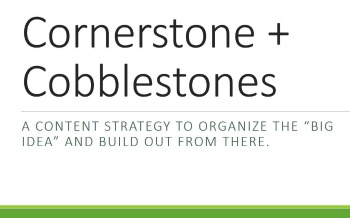In the search engine optimization (SEO) world, there are “white hat” and “black hat” tactics. Google has spent the last couple of years tackling keyword stuffing, link baiting, and other such black-hat efforts—that’s what the Panda and Penguin search algorithm updates were all about.
Now you know pretty much everything I know about SEO.
Well, there’s one more thing:
Strip away all the crap, and your great content will be findable again.
(Yes, I know I’m oversimplifying this.)
Because I’m no SEO expert and I’ve consistently avoided stuffing lots of keywords like entrepreneur, D.C. marketer, fab writer, queen-of-the-universe into my blog posts (please don’t hate me Google), I was excited to jump onto a Webinar on the topic recently. Until the speaker, an SEO specialist, spent the hour talking about content marketing techniques and tips to build your social media presence.
It was bad. But I learned one thing: hashtags may be the new frontier for keyword stuffing.
This is not how to use hashtags.
Using the example of a company that sells dog food, the Webinar speaker suggested that people insert #dogfood (and presumably also #dog) into their tweets. Umm… What?
Hashtags are multiplying, so learn how to use them wisely.
Twitter started it (well, started it in the popular social media lexicon). Facebook got in on the action. Google+ not only lets you tag your tweets, but also suggests tags for you (Google’s core business is, after all, search).
Here are three ways to use hashtags wisely:
1. To host (or participate in) a multi-party conversation. For example, Mack Collier’s #blogchat can draw 500 people and 2,000 tweets in an hour. So having a way to search the conversation in real time is essential.
2. To track social mentions of an event across platforms. At a recent conference, participants posted to Twitter, Facebook, Instagram, and Pinterest. Because they all used a common event hashtag, it was possible to track the conversation across the Internet.
3. To add your voice to the conversation. In my Google+ Community, I will add a hashtag to an occasional post so that it becomes part of the larger discussion around the topic (in this case the Washington Nationals).
It’s important to pick and choose what, where, and when you use hashtags so that you’re adding value. After all, do you want to be findable for your wisdom and the quality of your content or just found screaming into the digital ether?
Photo by Retis (Flickr).



